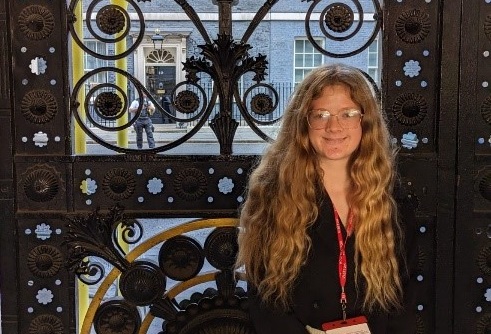Hi, I’m Layla and I’ve taken over Judith Herbertson’s role as Head of Girls’ Education Department for the day. I’m 16 years old, currently studying my A levels in geography, history and politics. I’m interested in a career in international development because I want to make a difference by helping others.
I’ve taken over Judith’s job as part of Plan International’s Girls Takeover, celebrating International Day of the Girl.
Back in 2011, the United Nations declared 11 October the International Day of the Girl This was to recognise girls’ rights and the unique challenges girls face around the world, focus attention on the need to address the challenges girls face, and promote girls’ empowerment and the fulfilment of their human rights. International Day of the Girl has been celebrated every year since 2012, but I am concerned that progress toward gender equality is off track.
Being Head of Girls’ Education Department for a day
I enjoyed meeting Sir Philip Barton, Foreign, Commonwealth & Development Office’s (FCDO) Permanent Under-Secretary, and Melinda Bohannon, Director-General Humanitarian and Development. I learnt a lot from them, including how to get into a career in international development, and their personal views on why girls’ education is so important.
I went on a tour of the King Charles Street building – I found it very grand and a little confusing; and was excited to see the Number 10 door. (Sadly, no sightings of Larry the cat.)
I chaired my first roundtable discussion on education in emergencies and protracted crises. This was a useful meeting, and I became more confident as time went on. I contributed to decisions on youth engagement ahead of the Global Refugee Forum, advocating for its importance. I also reflected on my experience of Ukrainian refugees arriving at my school and discussed the benefits of integration into national education systems, where this is possible.
I then chaired the Girls’ Education Department’s Senior Leadership Team meeting on COP28. I helped shape plans for the education event at the UK Pavilion and made recommendations for speakers and panellists to come from a diverse range of backgrounds, to ensure different perspectives and experiences are represented, particularly those of young people.
Why International Day of the Girl matters to everyone at FCDO
While Head of the Girls’ Education Department, I had the opportunity to interview Sir Philip Barton and Melinda Bohannon with some quickfire questions on gender equality. Here are their answers:
Sir Philip Barton, Permanent Under-Secretary at FCDO
What woman or girl inspires you the most?
My late mother has had the biggest impact on my life. Her father served in the Indian Imperial Army, so she was sent to Scotland alone and didn’t see her parents for 7 years. My mother went to St Andrew’s University at the age of 17 and graduated in foreign languages, and was independent for most of her life. At that time, it was very hard to have a career as a woman, but my mother overcame these barriers and was stoic and independent throughout her life.
Honourable mentions go to my twin sister and younger sister too, who both continue to inspire me.
Why is it important to include women and girls in foreign policy?
It is clear that better decisions are made when women are involved. In my experience, more durable and sustainable solutions are found through inclusive decision-making, with less aggression.
Beyond these benefits, there is a justice point here. It is simply not fair to exclude half the population. I am committed to ensuring fair representation for women in the FCDO.
Why do you think it’s important to promote education for girls in particular?
I saw the benefits of girls’ education while High Commissioner to Pakistan. Our UK aid programme was life-changing for each individual girl. There are wider societal benefits too, including the empowerment of women, improved health outcomes, greater choice and family planning options, better nutrition for children, and less gender-based violence. But girls’ education really is priceless for the individual, and we must ensure girls are educated for fairness and equality.
What has been your biggest professional challenge?
Russia’s invasion of Ukraine continues to be the biggest professional challenge I have faced to date.
Melinda Bohannon, Interim Director-General Humanitarian and Development
What woman or girl inspires you the most?
The women and girls in my family inspire me the most. At the ages of just 10 and 12 years old, my two daughters both care fiercely about fairness, following their inner moral compasses. My daughters inspire me to do my job well for other children around the world.
My grandmother is another inspiration, who came to this country as a refugee and had the faith to start a family in an entirely new place.
What is the UK doing to empower women and girls abroad?
We are breaking down barriers for women and girls around the world, including barriers to employment. Girls’ education is at the heart of women’s empowerment and gives women options that we take for granted here.
Our work to improve the lives of women and girls is wide-ranging, including our education programmes, our scholarships, our diplomatic work with the United Nations and our leadership with climate agencies.
Why do you think it’s important to promote education for girls in particular?
Fundamentally, this is about justice. Education gives girls voice, choice and control – helping them become empowered women who are better able to help their societies adapt and mitigate the effects of climate change and choose if and when to have children.
We have lots of evidence that the impact of girls’ education goes far beyond the girls themselves.
What’s it like being a senior woman in the FCDO?
I love my job. It hasn’t always been easy getting to this stage, and my advice to everyone, no matter what their gender, is not to worry too much about what other people think.

